- Home
- Brian Keene
The Conqueror Worms Page 5
The Conqueror Worms Read online
Page 5
“What do you figure it is, then? What did this?” Carl asked.
The things which grow out of the dust of the earth and destroy the hope of man.
“I don’t know.” Still kneeling, I reached out and touched the side of the hole. The odd slime clung to my fingers. Grimacing, I held my hand up and let the rain wash the milky substance off. I raised my fingers to my nose and was reminded of something I hadn’t thought of in years.
It smelled like sex. Youknow, that fishy almond odor that is always around in the bedroom afterward? That’s what this reminded me of. An otherwise sweet memory, dimmed with age and now twisted with this new significance. It’s the same smell youcan find drifting in the air on a rainy day after the worms have crawled out to claim the sidewalks. The same thing I’d smelled when I first discovered the worms on my carport.
Carl sniffed. “Something smells funny. Have you been eating sardines today?”
“It’s this stuff. Why don’t you try some? See what it tastes like.”
“No thanks. I think I’ll pass. What’s it feel like?”
“Snot, like a big old wad of mucous.”
Carl’s nose wrinkled in disgust. “I don’t reckon you’d better fool with it anymore. Might be some animal’s spunk for all we know.”
“But what kind of animal?”
Carl shrugged and started stacking the kindling back onto the pile. Then he wandered around the corner of the tool shed, informing me that he needed to take a piss.
Staying crouched over, I looked at the hole and remembered the robin and the thing I thought I saw. Had it eaten the bird or had I imagined it? I kept running over it in my mind. Maybe I was the one getting Alzheimer’s. You’re probably thinking that I’m obsessed with the disease, seeing as how I wondered if Carl had it too when he told me about what happened at his place. But I’m not obsessed. It didn’t run in my family, but when you’re my age, it scares you just the same. When your body goes, your memories are the only things that you have left. The only things you can truly call your own. Your memories are your life, and if you lose them—or worse yet, if you can’t trust them anymore—then I figure it’s time to lie down in a pine box and let them throw the dirt over you.
I thought about it some more and decided that I was pretty sure I saw the whole thing. And that scared me. Scared me even worse than the possibility that it was all a symptom of dementia. Because worms that big just didn’t exist. And they sure didn’t eat birds.
“We ought to be getting inside now,” I said, trying not to show the fear creeping over me.
“What’s that?” Carl hollered. He came back around the corner, shaking his limp, shriveled penis, and stuffed it back into his pants. The rain started to come down harder and thunder rolled out of the forest, obscuring what I’d said.
My knees popped as I rose to my feet. My joints were screaming, unused to the exertion I’d just put them through with the barrels. I cupped my hands over my mouth, shouting over the thunder and the drum of the raindrops pounding the leaves.
“I said that I think we should—”
Another blast of thunder boomed over the mountains, closer now. Hidden beneath it, I imagined I heard a muffled thump coming from inside the tool shed.
I hobbled over to Carl and said, “I reckon we should get inside. We’re gonna get pneumonia if we stay out here much longer.”
“I suppose you’re right. I’m soaked clean through to my skivvies.”
We slogged back to the house and got out of our wet clothes. I hung them up to dry, lent Carl some clean drawers and a pair of pants and a shirt, then fixed us each a cup of coffee. We sat in the living room, making small talk and letting the hot mugs warm our cold hands. Carl, still the master of stating the obvious, confirmed that it was indeed some weird weather we’d been having. The weather had always been one of his favorite topics, so I figured he was really in his element now.
He rubbed his arthritic knees and winced. “Boy, I hate being old.”
“Me too. You ever look at a photo of your younger self and wonder where he went to?”
“Shoot,” Carl snorted. “These days, I’m lucky if I can remember him at all.”
I rubbed my sore biceps. “Picking those barrels up wore me out. I don’t know what I’d have done if you weren’t here to help.”
Carl nodded. “I’m pretty tuckered out myself.”
“The coffee will wake you up. It’s strong stuff. You could strip paint with it.”
He glanced down at the coffee table, where my crossword puzzle book and a pencil were lying.
“Doing one of your crosswords, are you?”
“Yep. But I’m stuck. I don’t suppose you’d know a three-letter word for peccadillo?”
“Peccadillo—isn’t that the name of that young fella who wrote those Westerns? The ones with the pregnant gunslinger and the escaped slave and all that?”
“No, I don’t think so.”
“Oh. Well, then I’m stumped. Never much cared for those books either, to tell you the truth.”
He droned on while I wondered why God had seen fit to make Carl and myself the only survivors. I was dying for some good conversation, craving it almost as bad as the nicotine.
“So, have you heard from or seen anybody else?” I asked.
“Nope. No one. Punkin’ Center’s like a ghost town. I did hear an airplane about a week ago, though. Sounded like one of those little twin-engine jobs. I ran outside to have a look, but I couldn’t see anything by then, on account of the cloud cover. And one day, when the fog lifted for a bit, I spotted a helium balloon. I waved my arms and tried to get their attention, but it was a long way off. I don’t reckon they saw me.”
I blew on my coffee to cool it, and then drained the mug in one swallow. “Well, at least that means there’s still folks alive somewhere.”
“There’s got to be,” he agreed. “I stopped by Lloyd Hanson’s place a while back, because his dairy cows were mooing up a storm. He wasn’t there.”
I thought about the missing livestock I’d noticed. “But the cows were?”
“Not all of them. I reckon a bunch of the herd wandered off somewhere. But the ones inside the barn…it was awful, Teddy. Their udders had swollen up and busted since nobody was around to milk them. Most of them were dead, of course, or dying.”
I shuddered. “I haven’t seen any animals other than some deer and a robin. The pastures have all been empty.”
“Maybe they got loose? I’m sure the ground is wet enough in some places that the fence posts probably fell over.”
“Could be.” But I wasn’t sure if I believed that. Images of the robin flashed through my mind. I considered telling Carl, but didn’t. I was afraid he’d tell me I really was crazy. Same reason folks don’t tell their friends when they see weird lights in the sky.
Carl sat his coffee mug down on a coaster. “There was a hole in the middle of the pasture. Another sinkhole, I imagine. Maybe his herd fell through that.”
“One cow, maybe. But the entire herd? They’re cows, Carl, not lemmings.”
“Those little penguins that jump off cliffs together? I don’t think we have those in West Virginia, do we?”
I fixed another cup of coffee and bit my tongue.
“How about you?” Carl asked. “Have you seen or talked to anybody since the evacuation?”
“No one. Like I said earlier, until today, I thought I was alone. Nobody has stopped by. I wonder if there’s any other folks left on the mountain?”
“I’ll bet crazy old Earl Harper’s alive,” Carl said. “Ain’t no way those National Guard boys got him to leave.”
I snickered. “I reckon so. He was liable to put up a fight if they asked him to.”
“Think we ought to go check on folks? Drop by some houses and see if anybody’s still around?”
I hesitated, remembering my ill-fated trip down the mountainside. It was dangerous for men our age to drive these back roads, especially when the roads were slick with
rain, washed out in places, and covered with downed trees and loosened boulders.
“I don’t think it’s too smart for us to go gallivanting around with conditions the way they are. But I guess maybe we should at least look in on Earl. Make sure he’s okay. His shack ain’t that far away.”
Carl’s eyes grew wide. “I don’t want to go messing around the Harper place, Teddy. We say howdy to Earl, and that lunatic is likely to shoot us for trespassing.”
“He might, but we should still make an attempt. It’s the Christian thing to do. What if he’s sick and needs help, or what if he’s out of food? He could be lying out there with a busted leg or something. If it were us, we’d want somebody to show up and help.”
“But he ain’t us.”
“All the more reason to show him a kindness.”
Carl sighed heavily. “I’m telling you, Earl Harper’s liable to shoot first and thank us for our kindness later. But I guess you’re right. He is the closest after all. Him and the Simmonses.”
“Dave and Nancy?” I asked. “Surely they’re long gone by now.”
Carl nodded. “Yeah, they probably are. Didn’t look like no one was home when I drove by.”
“Well, let’s get this over with.” I pushed my chair back and stood up.
Carl’s eyes got big. “Now?”
“Yeah. We’ll check on Earl, then come back and eat supper.”
We finished up our coffee, shrugged back into our rain gear, and slogged back out to Carl’s truck. It coughed to life, shot blue smoke from the tail pipe, and rattled and rumbled the whole way out the lane. Carl had a cassette player in the truck, and we listened to Johnny Cash sing about Sunday morning coming down. I always liked that song, but now the lyrics took on a sinister new meaning.
“Damn wiper blades need changing,” Carl muttered, squinting through the rain-streaked windshield.
I nodded, lost in thought. Goose bumps ran along my arms and neck, both from the dampness in the air and the sound of the Man in Black’s low baritone grumbling out of the speakers. He’d always had that effect on me, especially after his death.
“You’re awfully quiet,” Carl said. “What you thinking about, Teddy?”
“Death,” I told him. “I’m thinking about dying.”
“Dying ain’t much of a living, boy,” Carl said.
After a moment, I realized that he was quoting Clint Eastwood in The Outlaw Josey Wales, one of his favorite movies.
“Maybe not, but that’s what’s on my mind.” I wiped condensation off the window with my sleeve.
“Well, that’s not very cheerful. Why do you want to be thinking about something like that?”
“Because when you’re our age, what else is there to think about? Especially now?”
Carl was quiet for a moment, his brow furrowed in thought. Then he smiled and said, “The Andy Griffith Show.”
“What?”
“The Andy Griffith Show. You asked what else there was to think about. I like to think about The Andy Griffith Show and Hogan’s Heroes. And Barney Miller, too. They always make me laugh.”
I agreed that they were among television’s greatest comedic achievements, but thought Carl was missing the point.
“There aren’t going to be anymore reruns of Andy Griffith or Hogan’s Heroes, Carl.”
“They could always do another one of those reunion shows, couldn’t they?”
“Who would watch it? Who’s left to make the damn thing? It’s over. Everything is gone. The world’s gone! There’s not going to be any more television programs or movies or books or Johnny Cash tapes. Don’t you understand? Are you that stupid?”
His face darkened. “Ain’t no reason to call me stupid, Teddy.”
“I’m sorry. Really, I am.”
Carl took the next turn a little too sharply, and our shoulders bumped into each other.
“That’s okay,” he sighed. “I reckon we’re both stressed.”
“Maybe, but it still didn’t give me the right to call you that.”
He grinned. “Hell, we both know I’m dumber than a stump.”
I snickered.
Still laughing, Carl turned the defroster off and on, trying to make it work. “So this is the end of the world?”
“Well, something’s gone wrong. This rain surely ain’t natural.”
“But there’s got to be other survivors, don’t there? People like us?”
I shrugged. “Sure, sitting huddled together high on a mountaintop, watching the waters rise higher and higher all around them. They’re just biding their time, same as we are. We’re just biding our time until something else happens.”
“Like what? Things are pretty bad. I don’t see how they could get worse.”
“Death. Drowning. Heck, I don’t know. Forget about it. I’m sorry. It’s just the weather, is all. It’s getting me grumpy. Makes my arthritis act up.”
“Mine too. I always wanted to live to be old, and now that I’m here, I wonder why I ever wanted such a thing.”
I nodded in quiet agreement.
He drove around a big bale of wet hay that had rolled out into the road. “What do you think caused it, Teddy?”
I shrugged. “Global warming? Though I heard some scientists on TV saying the ice caps hadn’t melted. Maybe a magnetic shift at the poles? Or a comet…or something like that? I don’t rightly know. We’ve been messing with this planet for too many years now. Could be that old Mother Nature has finally decided to fight back.”
“Yeah, but the good book says that He promised not to do it again, and God would never go back on His word.”
Thunder crashed in the skies overhead and the rain pelted the roof of the cab like thrown stones. The wind hammered into the side of the truck, forcing Carl to swerve.
“Well,” I said, “maybe the Lord got tired of us breaking our promises to Him, so He decided to break one of his own.”
Carl whistled, a low and mournful sound. “Rose sure wouldn’t stand to hear you talk like that. She’d have a fit.”
“Rose isn’t here, and to be honest, I’m glad she’s not. Breaks my heart to say that, but it would break my heart even more to watch her suffer through this—this mess.”
“Can I ask you something, Teddy?”
“What?”
“Well, you and Rose always knew the Bible better than most, especially when it came to all that prophecy and end-of-the-world stuff. I never understood all that; what with the little horn and the big horn and the lake of fire and the trumpet. But the world wasn’t supposed to end in a flood, was it?”
“No.” I shook my head. “It wasn’t. We were supposed to get a great beast, and I haven’t seen one yet.”
“Well, maybe the beast will be along before this is all over.”
“That’s not even funny, Carl.”
We continued on down the road, and I saw something out of the corner of my eye—or rather, I didn’t see it. I told Carl to stop.
“What is it?” He put the truck in park.
“Steve Porter’s hunting cabin.”
Carl wiped condensation from the window. “I don’t see it.”
“That’s right.”
He tilted his head. “What’s right?”
“You don’t see it.”
“Teddy, are we doing an Abbott and Costello routine here, or what?”
“No.” I pointed to the empty, muddy field. “You don’t see Steve’s cabin because it’s not there any longer.”
Carl scratched his balding head. “But that’s the spot where it used to be. What are you saying, Teddy?”
I fought to keep the impatience out of my voice. “I’m saying it ain’t there no more. The cabin is missing.”
Carl’s jaw dropped. “Well, I’ll be…”
We both stared at the vacant field, not sure what to make of it. Steve Porter’s cabin had sat far in off the road, right next to the tree line. It was hard to tell through all the rain, but it looked like there might be a sinkhole there. There
was a depression where the cabin had been.
Carl must have noticed the sinkhole, too, because he said, “I reckon it must have collapsed into the ground, same as my place.”
“Could be.” I nodded. “At least we know there was nobody inside. Steve doesn’t use that camp except during deer season. This time of year, he works in Norfolk.”
“They got flooded out pretty quick,” Carl noted. “Guess Steve won’t be coming around to use it this year.”
“No, I don’t reckon he will.”
We continued on our way. Carl didn’t say much, and I figured he was focused on staying on the road. I stared out at the rain and the mist because there was nothing else to look at.
“Here’s what I don’t understand,” I finally said. “With all this rain, you’d think it would do something to the atmosphere.”
“How so?”
“Well, I’m not sure what exactly. But it would seem that a storm this prolonged would affect the oxygen balance or something. Course, I’m not a scientist.”
Carl pumped the brakes, bringing us to a slow, sliding halt in front of Dave and Nancy Simmons’s place. He stared out the driver’s side window.
“Why are we stopping again?” I asked. “Dave and Nancy’s house is still standing.”
“Yes, it is.” Carl squinted through the driver’s side window. “But that’s not what I’m looking at.”
“Well, what are you looking at?”
“I didn’t notice it before when I drove past earlier, but their door’s open.”
“What?”
I looked at the house, and sure enough, the front door was wide open. The screen door hung crooked, swinging back and forth on one hinge and banging into the aluminum siding. Every new gust of wind blew sheets of rain into the living room. Dave’s truck and Nancy’s Explorer both sat in the driveway, buried up to their bumpers in mud. Dave and Nancy were good folks. Dave worked as a corrections officer down at the prison in Roanoke, and Nancy worked part-time at the telemarketing place in White Sulphur Springs. They were a young couple, early thirties and married for about five years. No children. Both of them had been awfully good to Rose and me over the years, and secretly we’d thought of them as our adoptive kids. Dave had helped to shovel snow in the wintertime and Nancy had come over to socialize with Rose at least once a week before she’d died. She’d come to visit me, too, after Rose was gone. They both had.

 The Rising
The Rising Entombed
Entombed Take the Long Way Home
Take the Long Way Home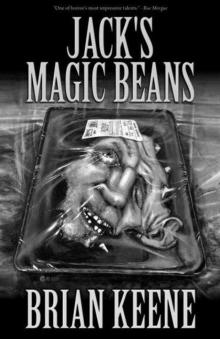 Jacks Magic Beans
Jacks Magic Beans Ghost Walk
Ghost Walk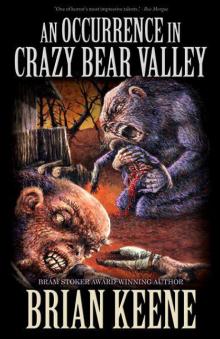 An Occurrence in Crazy Bear Valley
An Occurrence in Crazy Bear Valley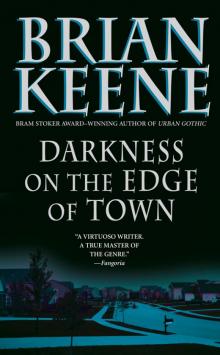 Darkness on the Edge of Town
Darkness on the Edge of Town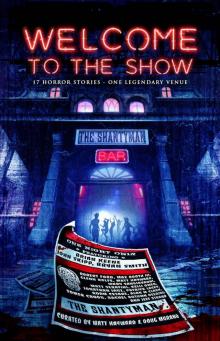 Welcome to the Show: 17 Horror Stories – One Legendary Venue
Welcome to the Show: 17 Horror Stories – One Legendary Venue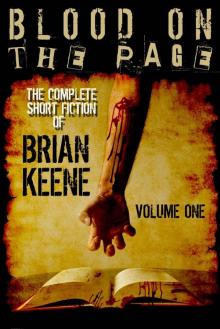 Blood on the Page: The Complete Short Fiction of Brian Keene, Volume 1
Blood on the Page: The Complete Short Fiction of Brian Keene, Volume 1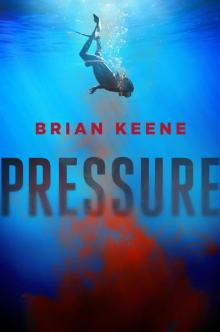 Pressure
Pressure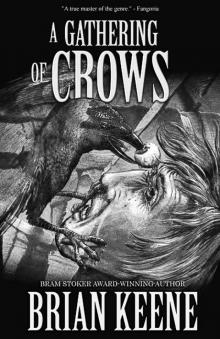 A Gathering of Crows
A Gathering of Crows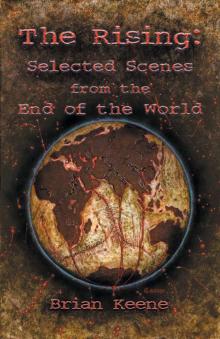 The Rising: Selected Scenes From the End of the World
The Rising: Selected Scenes From the End of the World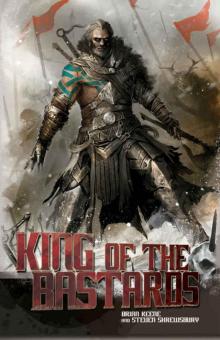 King of the Bastards
King of the Bastards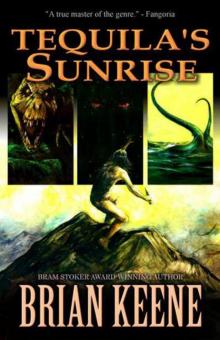 Tequila's Sunrise
Tequila's Sunrise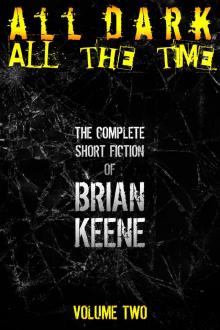 All Dark, All the Time
All Dark, All the Time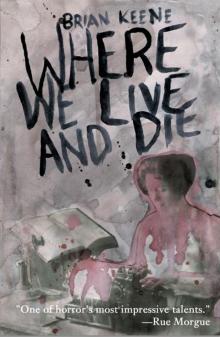 Where We Live and Die
Where We Live and Die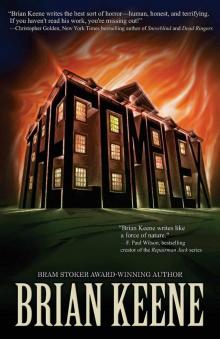 The Complex
The Complex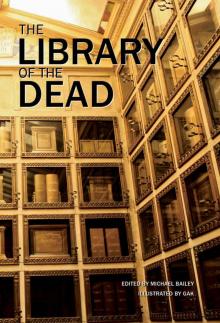 The Library of the Dead
The Library of the Dead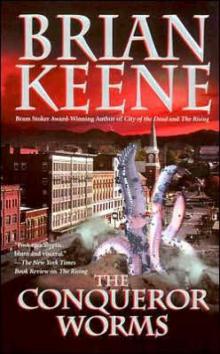 The Conqueror Worms
The Conqueror Worms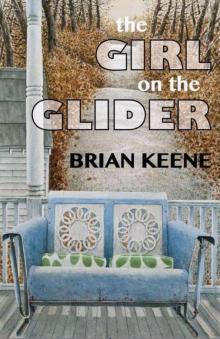 The Girl on the Glider
The Girl on the Glider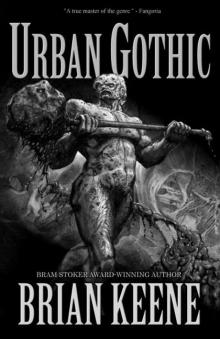 Urban Gothic
Urban Gothic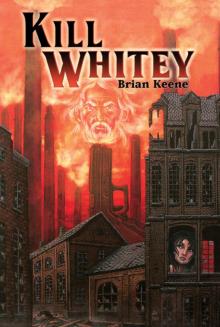 Kill Whitey
Kill Whitey Terminal
Terminal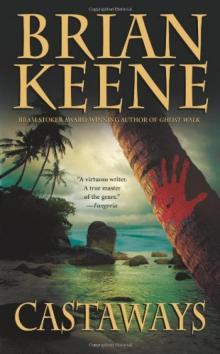 Castaways
Castaways